HEC and ChangeNOW 2023: Setting New Environmental Trends
HEC Paris was more present than ever in the annual ChangeNOW summit, organizing four sessions devoted to women entrepreneurs, transition and stability, impactful research and business for peace. The 2023 edition involving 35,000 participants from 120 countries was the ideal platform to expose the school’s engagement for solutions-oriented teaching to answer the planet’s most pressing climate challenges. It was also the occasion to celebrate the HEC Foundation Award for the Professor with the most impact in 2023, attributed to Yann Algan.
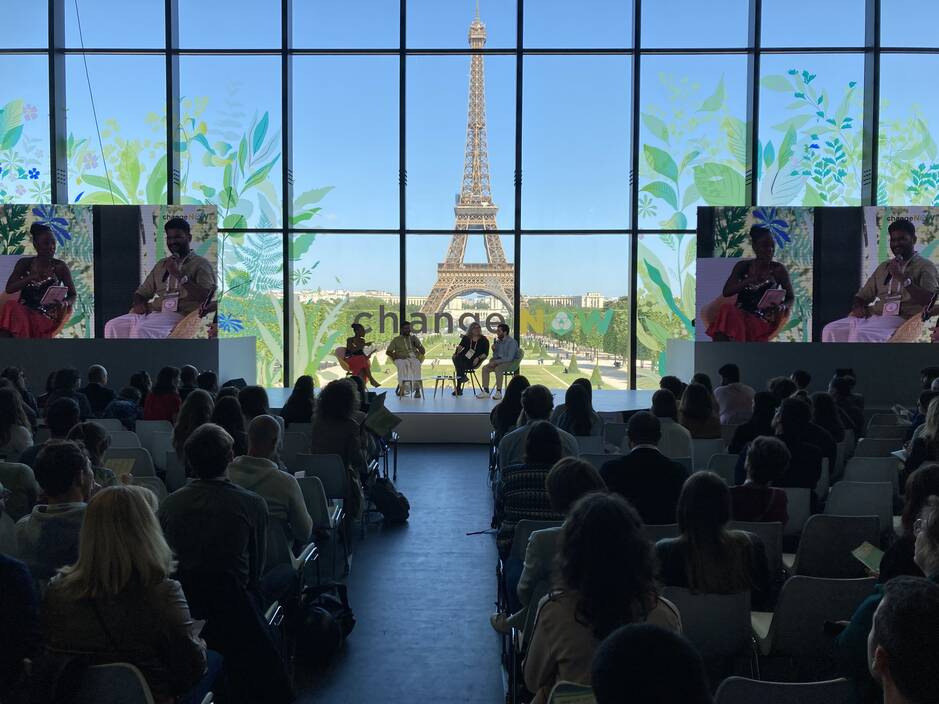
“What a day HEC Paris had at ChangeNOW!” exclaimed Eloïc Peyrache. The HEC Dean had just followed the May 26 exchanges on projects and ideas which are mobilizing the school’s entire staff, students and professors. “We are convinced that it is by bringing together expertise and skills, and by working with all stakeholders, that change will happen. That's how we want to contribute. That's what we are: a platform for impact.” True to the Dean’s word, the school organized debates featuring some of its most talented students, professors and alumni such as Pascal Lamy, Adrien Nussenbaum and Charles Autheman. “The conversation we had today around business and peace has been very useful for me to process the complexity of business in conflict zones,” said the latter after a lively debate on the topic, in a panel which also included Afghan refugee and HEC student Lima Safi. “How do European companies make concrete decisions in countries like Afghanistan or Ukraine?” Autheman asked, scratched his head. “There’s not a textbook for answers to such complex questions - or at least I haven’t found it. A lot of European businesses are in Ukraine, run by former HEC alumni. Do they lay off their staff there? Do they stop working with suppliers in Russia? How do they make their decision: on economic principles or moral and ethical values?”
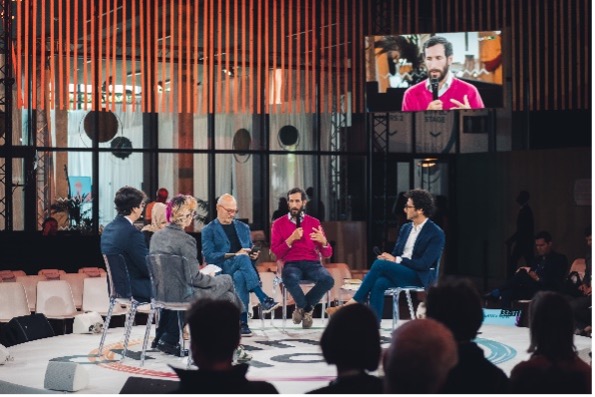
Master student Lima Safi comes from a nation devastated by decades of unrelenting war which has left a country in environmental and human desolation. The ChangeNOW panel exchange enhanced her determination to put sustainability at the heart of her ambitions: “We shouldn’t just be thinking of profit. If there is no nature, no healthy environment, then there is no human activity.”
Safi was one of two HEC students at ChangeNOW, thanks to the Imagine Fellowship program initiated by Adrien Nussenbaum. Zarmina Fedawi joined HEC in September 2022 and had a thought for the women left behind: “I want to learn as much as I can here and return to create opportunities for all Afghan girls and women. They’ve all lost two years under the Taliban. I want to create opportunities for them, they are very creative and strong. I just want to be a catalyst.”
Growing Awareness
Combining ethical business practice with sustainability has been at the heart of Adrien Nussenbaum’s approach ever since he set up Mirakl. The 2001 HEC graduate believes companies have a crucial societal role to play in combining business and peace: “With this program, I hope to personally contribute to conflict resolution,” he told a packed audience at the Circle Stage. “The Imagine program has welcomed five fellows so far, we hope it will be double that number in the new academic year. It’s a reflection of the huge progress there’s been in HEC programs, that they are able to accommodate these brilliant refugee students so well.” A sentiment shared by Charles Autheman: “HEC is building bridges between such engaged programs and its education courses,” said the professor, who doubles as a UN consultant. “Programs bringing together peace and business didn’t exist 15 years ago when I was a student at HEC. Now, they are at the heart of the school, thanks to new connections with the Global South and the latter’s preoccupations; and a growing awareness of the world’s interdependency, fostered by the COVID-19 crisis.”
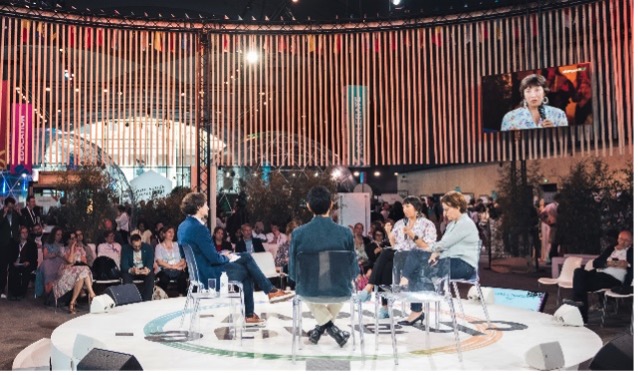 This growing awareness spilled over into the second HEC debate which explored ways which Europe can accelerate the energy transition in these times of crises. Moderated by HEC professor Igor Shishlov, it featured Camille Defard of the Jacques Delors Energy Center, HEC graduate Shedy Guiga and IPCC Lead Author Yamina Saheb. They shared a call to end fossil fuels production and the subsidies which feed them - and complemented each other in the priorities to take. For Guiga, it is time for public bodies to stop reacting and start anticipating, with long-terms perspectives. Sciences Po Professor Saheb insisted on a sufficiency concept which would reduce demand drastically: “We need to limit this need for energy and instigate a metamorphosis of the overall energy system which ends all subsidies to fossil fuels.” Defard, meanwhile, called for more collective intelligence, a holistic approach which would lead to more social justice and “a just transition”: “That means we need to reskill the workforce, including people in public administration.” “In a word,” concluded Shishlov, “we need to be bolder.”
This growing awareness spilled over into the second HEC debate which explored ways which Europe can accelerate the energy transition in these times of crises. Moderated by HEC professor Igor Shishlov, it featured Camille Defard of the Jacques Delors Energy Center, HEC graduate Shedy Guiga and IPCC Lead Author Yamina Saheb. They shared a call to end fossil fuels production and the subsidies which feed them - and complemented each other in the priorities to take. For Guiga, it is time for public bodies to stop reacting and start anticipating, with long-terms perspectives. Sciences Po Professor Saheb insisted on a sufficiency concept which would reduce demand drastically: “We need to limit this need for energy and instigate a metamorphosis of the overall energy system which ends all subsidies to fossil fuels.” Defard, meanwhile, called for more collective intelligence, a holistic approach which would lead to more social justice and “a just transition”: “That means we need to reskill the workforce, including people in public administration.” “In a word,” concluded Shishlov, “we need to be bolder.”
The Regeneration Generation
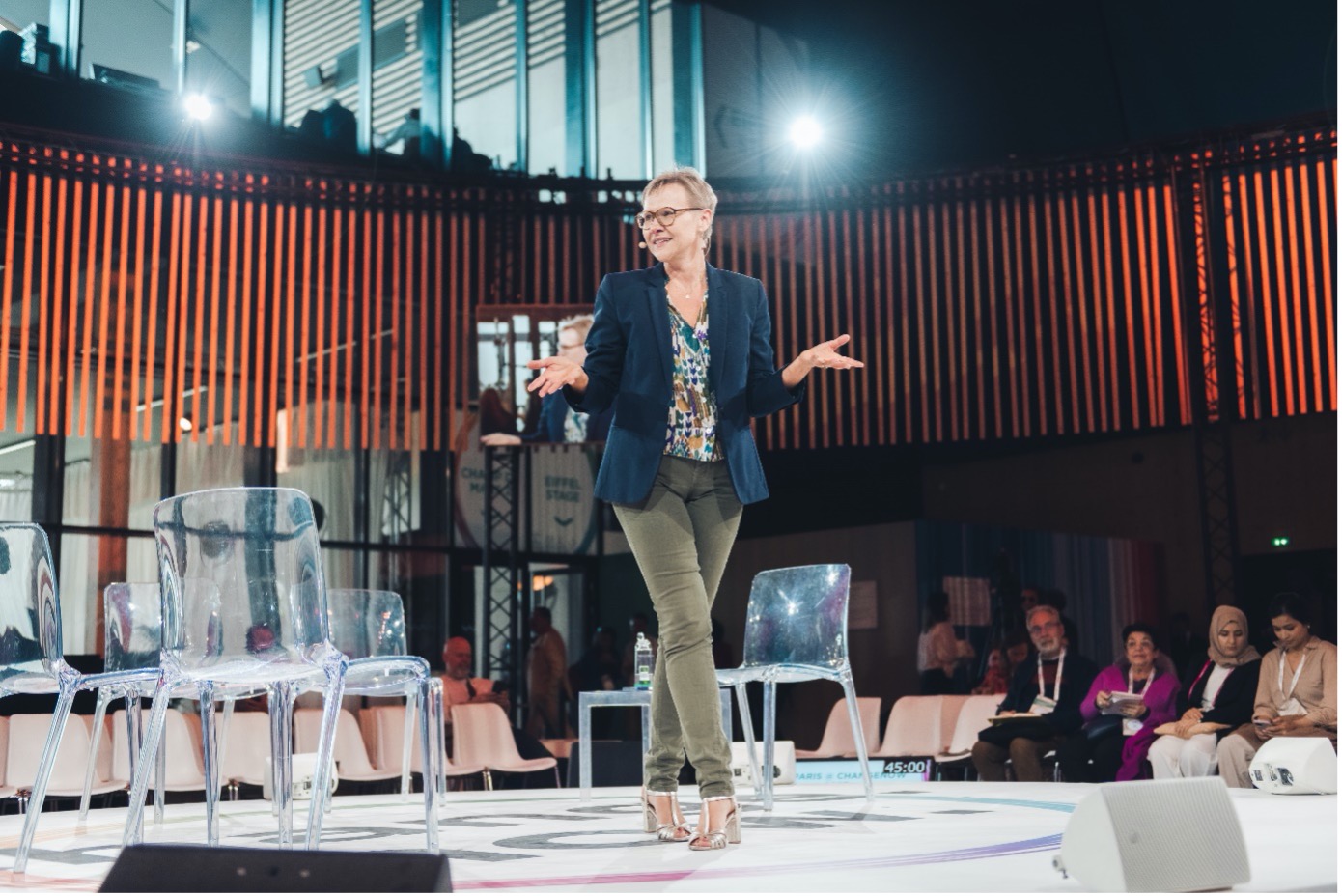
Boldness could help accelerate the concept of the regenerative company, which was at the heart of the final HEC-supported debate. This type of business gives back more to our planet and society than it takes, and HEC professor Laurence Lehman-Ortega led another lively debate to ascertain the challenges it faces. “To understand the context in which regeneration operates,” she told us, “we first have to reflect on planetary boundaries, those processes that contribute to the equilibrium of the Earth’s system. Six of the eight boundaries measured have already been crossed. That means that we have to repair, to restore, to regenerate our ecosystem. So, practically, if we want to engage a company in becoming reiterative, we need to reduce the negative impact at the incompressible threshold. And we must generate those positive impacts by reconnecting its activity with nature. For example, sourcing the supply chain is a way. Another is to renature our infrastructure, our equipment, to reconnect some production processes with bio products.”
Many of these processes were embodied by HEC graduate Sarah Dubreil, who shared the panel discussion with Lehman-Ortega. She has been working in the environmental sector for a decade, focusing on regeneration: “For me, connecting with living systems was the only option,” she told us after the hour-long debate. “We have to get back into planetary boundaries. We see entire regions adopting the regenerative approach. So, for example, how do I go towards a different way of doing agriculture, getting away from industrial agriculture? How do I integrate methods inspired by nature? Biomimicry can also be part of it.” The VC of Systemic Ventures pursued: “Frankly, it’s a complete change of paradigm. Let’s talk about permaculture, for example. In this case, you’re not focusing on external indicators but getting back to values that you will practice every day, caring for people, caring for us and sharing in a fair way. These values must be embedded in your governance and culture.”
Foundation Prize for Yann Algan
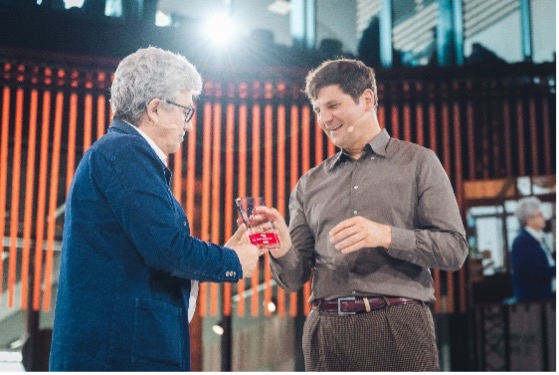 For graduate Sarah Dubreil, HEC Paris has a vital role to play in such reflections as systemic changes continue to grow. Such evolutions have been at the heart of the research by Professor of Economics Yann Algan. At ChangeNOW, he was the happy recipient of the HEC Foundation Award 2023 for works which have had the most impact in the past year. Algan’s decades of research on the role of trust and wellbeing in organizations and societies have been widely recognized for its impact. None more so than at HEC Paris, where he recently unveiled a series of measures to realign the school’s pre-experience core teaching. The president of the Award jury, Gilles Vermot Desroches of Schneider Electric, underlined the unanimous decision to reward Algan’s body of work which reveals the lifelong benefits of acquiring social skills at the youngest age. In accepting the prize, the co-author of “La Société de defiance: comment le modèle social français s’autodétruit” began with a quote from Vladimir Lenin: “The Soviet leader once said trust is good, control is better. Well, I would say just the opposite. Trust brings resilience, it’s the key to explaining democracy and galvanizing effective teamwork. Trust brings about wellbeing, reciprocity, it goes well beyond financial results.”
For graduate Sarah Dubreil, HEC Paris has a vital role to play in such reflections as systemic changes continue to grow. Such evolutions have been at the heart of the research by Professor of Economics Yann Algan. At ChangeNOW, he was the happy recipient of the HEC Foundation Award 2023 for works which have had the most impact in the past year. Algan’s decades of research on the role of trust and wellbeing in organizations and societies have been widely recognized for its impact. None more so than at HEC Paris, where he recently unveiled a series of measures to realign the school’s pre-experience core teaching. The president of the Award jury, Gilles Vermot Desroches of Schneider Electric, underlined the unanimous decision to reward Algan’s body of work which reveals the lifelong benefits of acquiring social skills at the youngest age. In accepting the prize, the co-author of “La Société de defiance: comment le modèle social français s’autodétruit” began with a quote from Vladimir Lenin: “The Soviet leader once said trust is good, control is better. Well, I would say just the opposite. Trust brings resilience, it’s the key to explaining democracy and galvanizing effective teamwork. Trust brings about wellbeing, reciprocity, it goes well beyond financial results.”
The HEC Dean of Pre-experience Programs went on to map out his current research on education: “We have been working on trust levels at a young age because most of our trust tools are acquired at early stages of life. Yet, trust levels in France are at a distressing level: only 20% of the French trust each other! That’s mainly because two-thirds of our children don’t do any collective work in classrooms. So, we are also working with educational authorities to change that, experimenting at primary school levels.”
ChangeNOW and HEC Look Towards the Paris Olympics
The 2023 ChangeNOW edition was widely greeted as the most successful since its inception in 2018. Its founder and CEO Santiago Lefebvre underlined the role HEC must play in such gatherings. “This year is the first one where we can talk about the consequences of climate change in the present tense,” he told us. “Because everywhere we look on the planet nowadays, we’re seeing the consequences of global warming. And business schools like HEC have a huge role in our response to this crisis. At present, you need to have business leaders that have a holistic view of what it means to be a business leader for the next century.” The man who wants to transform Paris into the “Florence of the green Renaissance” insisted on the need for business schools to widen their nets in this transition: “We need to do business in a very concrete space, where we include issues thrown up by climate change, where we confront diversity loss and overconsumption of our resources. If we want students to become good leaders, whatever field they choose, they must explore ways of solving these challenges.”
Not surprisingly, ChangeNOW 2024 is set to accelerate change in a Paris that is holding the Olympics in a year. And Lefebvre invited HEC to be part of the process. His organization is already firming up the objectives: “We began two years ago with Sports for Change and this will gather momentum. We have the support of big brands, but we are going to sponsor only if the sports events are making efforts from the ecological point of view.” An objective which ties in smoothly with those set up by the school and its student population.